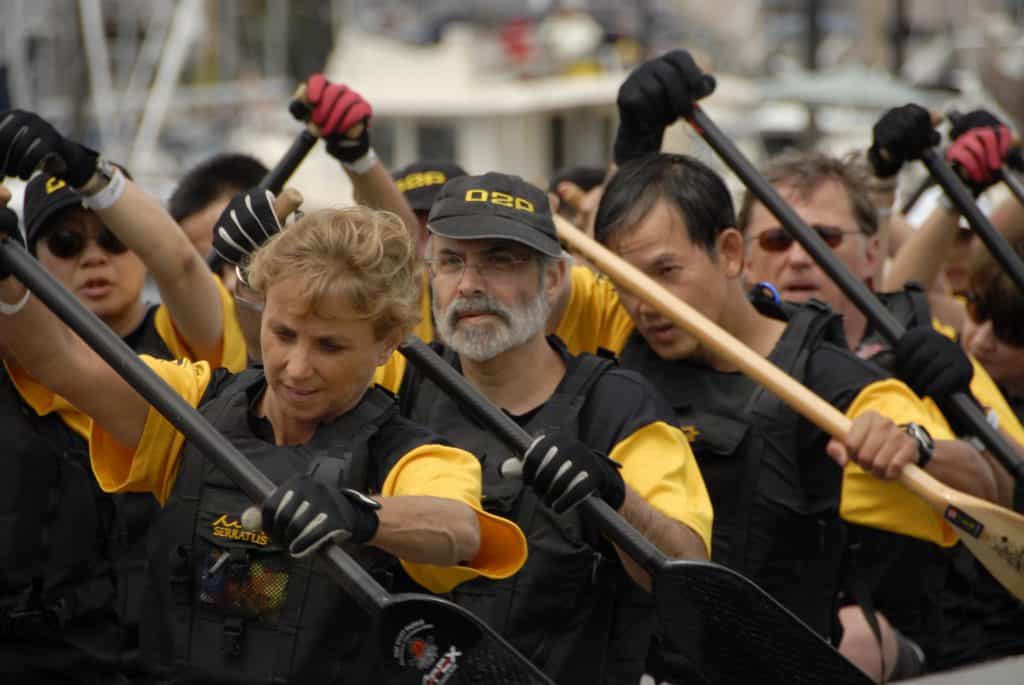Team honours founder Lisa Venables’ memory at this month’s Hong Kong International Dragon Boat Festival.
In the way physicians view patients, and especially patients with serious, life-altering illnesses, Lisa Venables was a model to be held up for all. Lisa was the kind of patient that amazed even doctors.
“Lisa never let her disease define her,” says Dr. Tony Chiu, one of Lisa’s physicians for 17 years until her sudden passing on May 18, 2017, just a week before the dragon boat team she founded was to depart for the world famous Hong Kong Dragon Boat Festival, which had been a long held goal of the team.
“This was a person who was on dialysis since she was a teenager,” says Dr. Chiu. “Yet despite this, she lived a full life, including a demanding and fulfilling career as a nurse. And what she did with the dragon boat team is simply amazing.”
As Dr. Chiu confirms, and as those who knew her would agree, if ever there was a dialysis patient who would take up dragon boat racing—it was Lisa Venables.
Spontaneity at heart of team’s founding
The year was 2000. Dr. Chiu was making his rounds on the dialysis unit and Lisa was seated in a chair receiving treatment. Dr. Chiu came over to say hi and Lisa commented on how bored she was, having to just sit there.
“Lisa said to me, ‘I just feel like I want to do something completely different,’” says Dr. Chiu. “So I said, ‘What do you have in mind?’ At that moment, it just so happened there was a dragon boat race on TV and Lisa pointed to the TV and said, ‘How about that?’”
Dr. Chiu smiled and so did Lisa. He suggested she should be more realistic. So she made him a challenge. She told Dr. Chiu that if she could find enough of her fellow patients who would be willing to form a team and try dragon boat racing, then he, Dr. Chiu, would help them raise the money to do it.
Dr. Chiu agreed, although partly, he admits, because he wasn’t convinced that Lisa was being serious.
One week later, however, Dr. Chiu got a call. It was Lisa. She had found enough patients to form a team. It was time for Dr. Chiu to step up.
“Now I had to find them money,” says Dr. Chiu, “and a coach!”
Destination Hong Kong
But things fell into place surprisingly fast, beginning with a nurse Dr. Chiu knew who was a dragon boat racer and who introduced Dr. Chiu to Patrick Couling, a competitive dragon boat coach who is seen today as a key figure in the rise of the sport’s popularity in BC. Patrick became the team’s coach and remains so today.
They also needed a name for their team. At one of their first meetings, Dr. Chiu (now a member of the team) asked for suggestions. A patient said one of the reasons why dialysis patients hope for a kidney transplant is so they may once again enjoy one of life’s simple pleasures—urinating. And so this patient’s witty suggestion—“O2P”—was chosen as the team name.
It was Lisa who suggested, in those early years, that a team goal could be to race at the Hong Kong International Dragon Boat Festival, which is regarded as the mecca of the dragon boat global community.
In addition to fundraising on their own, many people along the way helped O2P achieve this goal, including the festival organizers in Hong Kong, who sent the team a special invitation, waived the usual entry fees, and offered to “host” O2P, which included giving all 25 members of the team free accommodation in Hong Kong for four nights, helping to make the trip much more affordable.
What the physicians see
As Dr. Chiu has been participating in activities like the dragon boat team, he has come to see the psychological improvement in patients, and the difference these activities make in a patient’s outlook and how they manage their illness.
“It took me ten or 15 years to realize it,” says Dr. Chiu, “but when a person becomes sick, and when you require frequent treatment, as with dialysis, caregivers can tend to pamper you, to tell you that you’re sick and it’s okay to behave like a patient. We say, ‘It’s okay to not have ambition. It’s okay to sit back and be depressed.’ Sooner or later, that patient will become introverted. But when patients get out and play, and especially when they realize they can do things that healthy people can do, all of a sudden they become… much more alive.”
Dr. Chiu has seen many patients be hesitant at the suggestion of getting into a dragon boat. Yet he says that once they are in it, they enjoy it; and as they get to know other people, they enjoy it even more; and soon their confidence builds and, in many ways, they become a new kind of patient. Dr. Chiu says the emotional improvement is as important, if not more important, than the physical.
Friends of St. Paul’s Foundation have always been generous in their support of kidney research and care. The mandate of the “Paddle to Wellness” fund at St. Paul’s Foundation is to encourage kidney disease patients to use exercise to improve both their physical and emotional health.
“Paddle to Wellness is not just about dragon boats,” says Dr. Chiu. “Whenever any of our patients have an idea for any exercise or sports participation, just like Lisa did, when you give to this special fund you help us to help them along.”
